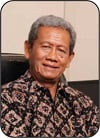Multicultural Education in Indonesia: An Alternative for National Education in Global Era
Abstract
ABSTRACT: Indonesia is still in the process of building its national culture. This is not simple process, considering the fact that there are various ethnic groups with its own characteristics and dynamics. Sometimes, the process causes tensions and conflicts. Furthermore, it is made more complicated by globalization trend which is very expansive in nature. This creates cultural shift which lead to find compromise. Very often this sort intercultural friction gives negative impact. This should carefully addressed by the government by creating a clear policy so that this multi-ethnic and multicultural state has stronger foundation for its existence. One way is by developing a national education which is based on cultural plurality. This paper tries to elaborate the concept and implementation on multicultural education. Due to multicultural approach, education is required to create human resources who is democratic, understanding and respecting differences and cultural and ethnic plurality, and able to keep with the development of science and technology. In the context of teaching and learning, a teacher should have good command of his/her subject matter, good skill of teaching, and good ability to guide learners to get high achievement, in order to develop learners ability and ideal character for the glory of the nation.
Key words: Indonesia nation-state, unity in diversity, multicultural education, national education system, and unity in democracy and prosperity.

About the Author: Drs. Sutijono, M.M. is a Lecturer at the State University of Surabaya (UNESA, Universitas Negeri Surabaya) and currently as a Rector of UNIPA (University of PGRI Adibuana), Jalan Ngagel Dadi III-B/37, Surabaya, East Java, Indonesia. He can be reached at: abdjae@yahoo.co.id
How to cite this article? Sutijono. (2010). “Multicultural Education in Indonesia: An Alternative for National Education in Global Era” in SOSIOHUMANIKA: Jurnal Pendidikan Sains Sosial dan Kemanusiaan, Vol.3, No.1 [Mei], pp.53-66. Bandung, Indonesia: Minda Masagi Press, UNIPA Surabaya, and UMS Kota Kinabalu, Malaysia, ISSN 1979-0112.
Chronicle of article: Accepted (February 1, 2010); Revised (March 4, 2010); and Published (May 20, 2010).
Full Text:
PDFReferences
Azra, Azyumardi. (2003). “Pendidikan Multikultural: Membangun Kembali Indonesia yang Bhineka Tunggal Ika” in Tsaqofah, Vol.I, No.2.
Depdiknas [Departemen Pendidikan Nasional or Ministry of National Education]. (2003). Undang-Undang RI Nomor 20 tentang Sistem Pendidikan Nasional. Bandung: Citra Umbara.
Depdiknas [Departemen Pendidikan Nasional or Ministry of National Education]. (2008). Stan Pembangunan Pendidkan Nasional. Jakarta: Depdiknas RI.
Feith, H. (1999). Sukarno dan Militer pada Zaman Demokrasi Terpimpin di Indonesia. Jakarta: Sinar Harapan, Translation.
Hatten, K.J. & S.R. Rosenthal. (2001). Reaching for the Knowledge Edge. New York: American Management Association.
Harrison, L.E. & S.P. Huntington. (2000). Cultures Matters. New York: Basic Books.
Kartodirdjo, Sartono. (1991). “Fungsi Sejarah dalam Pembangunan Bangsa: Kesadaran Sejarah, Identitas, dan Kepribadian Nasional”. Paper presented in National Seminar on the History V in Semarang, Central Java, Indonesia.
Kayam, Umar. (1981). Transformasi Budaya Kita. Jakarta: Sinar Harapan.
Kurniawan, H. (2010). “Media Pendidikan dan Multikulturalisme”. Available also at http://komjakarta.org/media-pendidikan-dan-multukulturanisme.htm#more [accessed in Surabaya: 17 March].
Natsir, M. (2010). “Mencari Corak Perdamaian dengan Sistem Multikultur”. Available also at http://ace-informasibudaya.blogspot.com/2010/01/perdamaian-sistem-kultur.html [accessed in Surabaya: 17 March].
Ohmae, K. (1995). The End of the Nation State: The Rise of Regional Economies. New York: The Free Press.
Ricklefs, M.C. (2004). Modern Indonesia History. Canberra, Australia: Palgrave Press.
Rosyada, D. (2010). “Pendidikan Multikultural Melalui Pendidikan Agama: Sebuah Gagasan Konsepsional”. Available also at http://www.google.co.id/search?hl=id&client=firefox-a&rls=org.mozilla:en- [accessed in Surabaya: 17 March].
Simbolon, Parakitri T. (1993). “Negara Bangsa atau Negara Wangsa?” Paper presented in the seminar on the Nationalism in Salatiga, Central Java, Indonesia.
Soedjatmoko. (1999). Keprihatinan tentang Masa Depan. Yogyakarta: Tiara Wacana.
Sowell, Thomas. (1989). Mosaik Amerika: Sejarah Etnis sebuah Bangsa. Jakarta: Pustaka Sinar Harapan, Translation.
Suparsa, I Made. (2010). “Peranan Multikultur dalam Pendidikan Nasional”. Available also at http://suparsa.blogspot.com/2010/01/peranan-multicultur-dalam-pendidikan.html [accessed in Surabaya: 17 March].
Supriadi, Dedi. (2000). Reformasi Pendidikan dalam Konteks Otonomi Daerah. Yogyakarta: Adicita.
UNESCO [United Nations for Economic, Social, and Cultural Organization]. (1996). Learning: Treasure Within. New York: UNESCO Publishing.
Undang-Undang Dasar 1945 dan Amandemennya. Jakarta: Media Centre, 2008.
Watson, B. (2004). “Multiculturalism: Its Strength and Weaknesses” in Jurnal Pendidikan Ilmu Pengetahuan Sosial (JPIPS), No.23, XIII [December].
Wiriaatmadja, Rochiati. (2002). Pendidikan Sejarah di Indonesia: Perspektif Lokal, Nasional dan Global. Bandung: Historia Utama Press.
SOSIOHUMANIKA: Jurnal Pendidikan Sains Sosial dan Kemanusiaan is published by Minda Masagi Press. This work is licensed under a Creative Commons Attribution-Sharealike 4.0.
